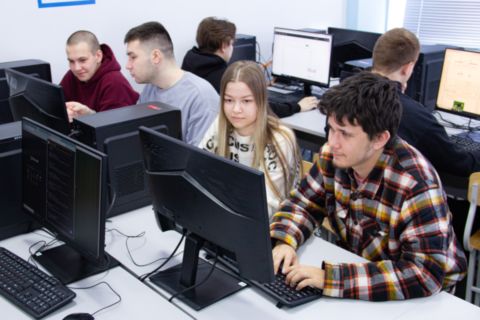Do you like to study robotics? Are you interested in artificial intelligence? We invite you to apply for AI in Robotics Master’s degree programme.
The Department of Electric Drive, Mechatronics and Electromechanics, in cooperation with the IT company OOO Firma “Intersvyaz”, have developed the Artificial Intelligence in Robotics Master’s degree programme for South Ural State University.
Advantages of studying in this programme:
– theoretical training is combined with a large number of practical classes using computers;
– free access to video recordings of lectures and presentations.
What tasks will graduates be able to solve?
-
draw up technical specifications for the design of elements of flexible manufacturing systems in mechanical engineering;
-
conduct experimental tests of the operability of software platforms of systems;
-
manage projects on creation of complex systems based on big data analytics;
-
manage projects on the part of the customer on creation, implementation and use of one or more end-to-end digital artificial intelligence technologies;
-
manage projects on creation, support and use of business intelligence systems at an organization.
Are you interested in industrial biotechnology? Do you want to study food industry? Do you wish to find a job in the field of environmental biotechnology? What if we tell you that artificial intelligence can be implemented in these areas? We suggest you to see it for yourself by enrolling in the Artificial Intelligence in Industrial and Environmental Biotechnology Master’s degree programme.
The School of Medical Biology in cooperation with OOO Napoleon IT, the Ministry of Agriculture of the Chelyabinsk Region, and OOO Soyuzpishcheprom Association, have developed the Artificial Intelligence in Industrial and Environmental Biotechnology Master’s degree programme for South Ural State University.
Training in this area will allow you to develop professional competencies in the field of key artificial intelligence technologies used in industrial and environmental biotechnology. In the process of mastering the competencies, Master’s students are trained in methods of processing and analysing eco-monitoring data of the bio- and technosphere; using a computer vision system; the fundamentals of robotics and artificial intelligence technologies based on Big Data processing.
Courses and disciplines studied in this programme:
-
Modelling of Micro- and Nanostructured Materials;
-
Simulation of Biotechnological Production Processes Using AI Methods;
-
Scientific Approaches to Creating Functional Biomaterials;
-
Practicum on Eco-biotechnology in Industrial Production;
-
Industrial Biosafety and Human Ecology;
-
Industrial Microbiology in Environmental Biotechnology;
-
Waste Management in Industrial Manufacturing;
-
Analysis of Biotransformation Processes Using AI Methods;
-
Diagnostic Sensors for Environmental Safety Monitoring;
-
Intelligent Data Analysis in Biotechnology;
-
Molecular Modelling in Biotechnology;
-
Low-carbon Biofuel Technologies;
-
New Technologies of Waste Bioremediation;
-
Seminar on Application of AI Methods in Industrial and Environmental Biotechnology;
-
Sensory Evaluation of New Types of Bioproducts Using AI Methods.
In order to enrol in the programme, you should pass admissions examinations: testing and an interview with the manager of the Master’s programme.
During the process of studying, you will learn to:
– manage projects on creation, support and use of artificial intelligence systems in the field of industrial and environmental biotechnology;
– select and use modern methods for processing eco-monitoring data of the bio- and technosphere;
– use computer vision systems (video monitoring of biotechnological processes, bioremediation processes, sensory evaluation of bioproducts);
– apply biosensors and test systems to perform various biotechnological tasks, intelligent control of microbiological and enzymatic processes;
– master artificial intelligence technologies based on Big Data processing (identification of enzymes, microorganisms and other elements of biotechnological systems and forecasting their properties in biotechnological processes);
– master skills of conducting scientific research in the field of biotechnology.
After completing the Master’s programme, you will be able to be employed at:
-
food industry enterprises as technologists or specialists in processing organic raw materials based on the principles of zero-waste production;
-
agricultural enterprises as specialists in deep processing of raw materials to reduce emissions and waste; specialists in the production of plant protection products and biofertilizers; specialists in the production of feed protein and other biological components of feed and premixes;
-
industrial enterprises as specialists in wastewater treatment, bioremediation of industrial waste, and environmental monitoring.




